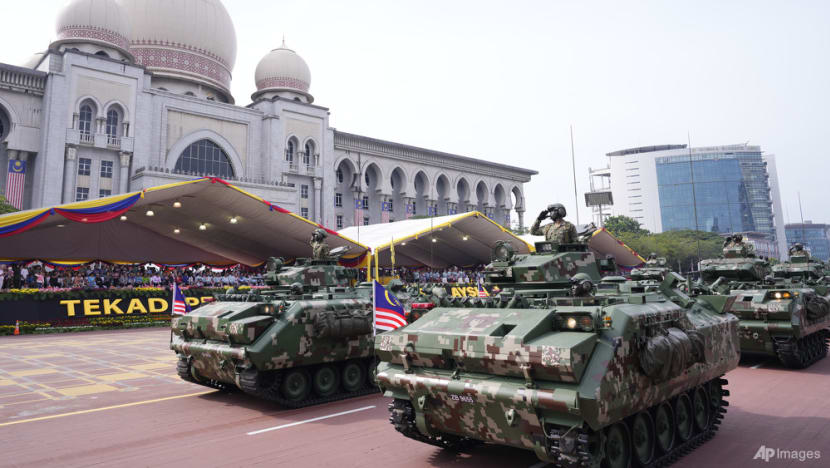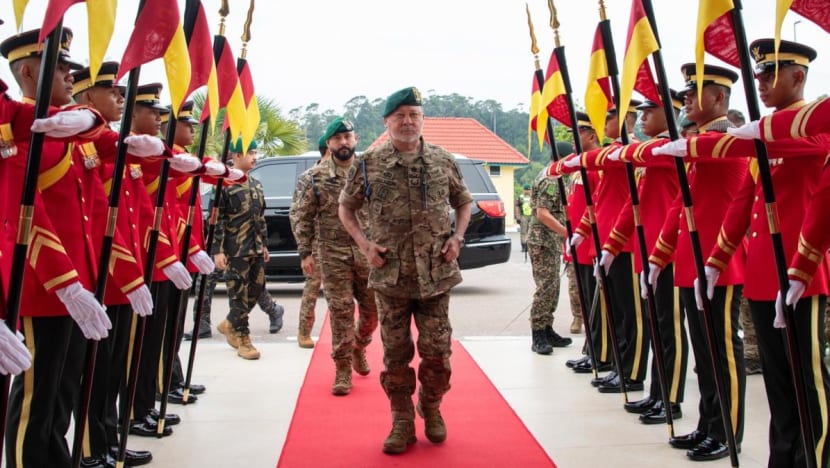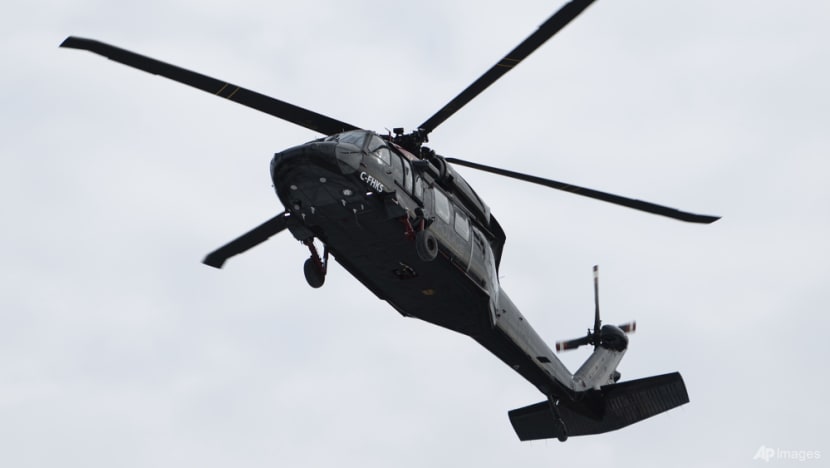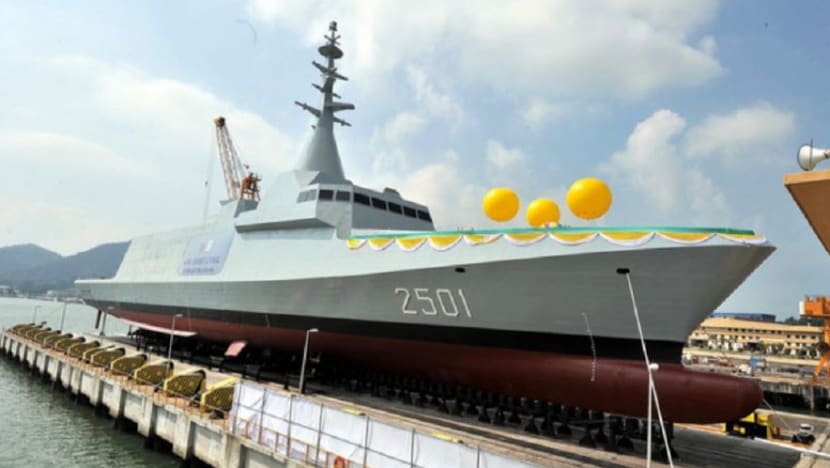analysis Asia
Malaysia king’s unprecedented warning on defence procurement a ‘wake-up call’, but can it spark reforms?
The king recently ordered the government to halt a deal for Black Hawk helicopters and rebuked “agents” and “salesmen” at the Defence Ministry over past mistakes in procurement.


This audio is generated by an AI tool.
KUALA LUMPUR: A recent rebuke by Malaysia's king has brought into focus an open secret in the country’s defence procurement: The role of middlemen.
These agents are at the heart of a system that can lead to inflated prices and, together with other factors, can compromise the military readiness of the country, said analysts, who called for greater oversight and other measures to curb the risk of project and fund mismanagement.
The observers also hoped King Sultan Ibrahim Sultan Iskandar’s hard-hitting remarks at the 60th anniversary parade of Malaysia’s Special Service Regiment on Aug 16 – which some said were unprecedented – would catalyse reforms.
The king had ordered the government to scrap its plan to procure Black Hawk helicopters that were over 30 years old, likening them to “flying coffins”.
The monarch also spoke out against “agents” and “salesmen” at the Defence Ministry, warning them not to “fool” him and “repeat past mistakes” in procurement.
He added that if all defence asset purchases are made at inflated “middleman” prices, the government’s budget allocation would never be sufficient.
“POLITICALLY CONNECTED FIRMS FAVOURED”
Intermediation by agents who are often retired military officers, even generals, has long been entrenched, said Jamil Ghani, a doctoral candidate at Singapore's S Rajaratnam School of International Studies.
“Procurement is predominantly conducted via single-source or limited tendering, with fewer than one-third of major contracts awarded through open competition,” noted Jamil, whose research interests include Malaysia’s foreign and national policies.
“This environment favours politically connected firms – often with ex-military figures on their boards – allowing agents to exert significant influence over the structuring of deals.”
According to the 2020 Government Defence Integrity Index by Transparency International Defence and Security, a programme of the non-governmental organisation Transparency International, there was open competition in only 20 to 30 per cent of Malaysia’s defence procurement.
“Despite some progress, corruption risks remain significant throughout Malaysia’s defence governance architecture,” the study released in November 2021 found.
“Parliamentary oversight is nascent and requires sustained attention to ensure progress is not lost,” stated its country brief for Malaysia.
“Procurement is still prey to powerful interests, both foreign and domestic, and vulnerable to corruption.”
Raymon Ram, the president of Transparency International Malaysia, told CNA that price discrepancies occur when middlemen and agents, including retired officers or individuals with political ties, insert themselves in deals, adding unnecessary commissions.
“This is compounded by weak competition, direct negotiations and a culture of secrecy often justified under ‘national security’,” he said.
Former navy rear-admiral Danyal Balagopal Abdullah told CNA the Ministry of Defence can be a “cash cow” for those looking to profit from procurement deals, as not many people question such transactions due to their limited knowledge of defence matters.
“When you use it for the defence of the country, it is of national interest. So who wants to question (the use of funds)?” he said.

WHAT CAN BE DONE
In his remarks on Aug 16, Sultan Ibrahim said those involved in military procurement must ensure evaluations are done transparently, based on market prices and the actual needs of the armed forces.
“Don’t waste time purchasing nonsense that does not fit the military’s needs. If you don’t know what the actual (market) price is, ask me first,” he said.
He cited the purchase five years ago of rigid raiding craft for commandos for RM5 million (US$1.18 million) as an example, saying he could have sourced a “better boat” for under RM2 million.
“Recently, I heard there was a proposal to buy a similar boat but in a larger size, at nearly RM10 million. This makes no sense and must be carefully reviewed,” he said.
Sultan Ibrahim also claimed a textile trader had tried selling the Defence Ministry drones, but did not elaborate.
The king’s remarks underscore the urgent need to modernise procurement practices, prioritise safety and recalibrate Malaysia’s defence strategy in light of security challenges such as tensions in the South China Sea, experts said.
“Malaysia cannot afford to remain underprepared. The king's intervention may catalyse overdue reforms and elevate military readiness to meet future challenges,” said Ridzwan Rahmat, principal military analyst at defence intelligence provider Janes.
He said stronger project monitoring frameworks and enforcement of performance-based contracts can help to address broader issues such as poor contractor oversight, lack of accountability and weak internal controls.
“I think mandatory oversight by a military procurement committee within the government, hopefully non-partisan, would help,” he said.
For greater accountability, mechanisms such as integrity pacts - where a third party is given oversight to ensure anti-graft compliance - could be institutionalised in defence procurement, Raymon suggested.
“These tools have been successfully deployed in countries such as South Korea and India, where independent monitors ensure contracts are fair, competitive and corruption-free,” he said.
End-users should be involved in evaluating suitability and value to prevent purchases driven by vendor lobbying or political influence, Raymon said.
Performance-based contracting, introduced in July 2022 by Malaysia’s Ministry of Finance, should be applied systematically across major projects such as infrastructure defence-related projects so payments are tied to delivery milestones, said Jamil.
“Addressing these challenges requires stricter vetting of contractors, milestone-based progress reporting, and the use of performance bonds to enforce timely delivery. Independent oversight of major projects would also help reduce slippage,” he said.
A WAKE-UP CALL?
Sultan Ibrahim's remarks also became a talking point for being possibly without precedent – as well as reflecting the frustration with defence procurement missteps felt by some members of the public, analysts said.
As the Supreme Commander of the Malaysian Armed Forces, past monarchs have traditionally maintained a more ceremonial and advisory role, refraining from such direct public criticism.
Sultan Ibrahim was sworn in on Jan 31, 2024, under Malaysia’s unique rotational system in which the country’s nine Malay rulers take turns to be king in five-year cycles.
“It is unprecedented; no other king has done this if I recall correctly,” said Ridzwan of the monarch’s comments.
“Nonetheless, the king’s message should be a wake-up call for Malaysia’s defence establishment.”
While the king cannot unilaterally veto or approve contracts, he is, by convention, entitled to “advise, caution and warn”, Raymon said.
“The king’s public admonition carries immense moral authority and political weight, even if it is not legally binding,” he said.
Sultan Ibrahim also cited Malaysia’s purchase of Skyhawk aircraft in the 1980s as an example of why the purchase of the old Black Hawks should not go ahead.
Malaysia had reportedly bought 88 such Vietnam War-era jets from the United States, of which only 40 were refurbished and put into service. State news agency Bernama reported that the jets were later retired due to a high accident rate.
His words have already made an impact.
On Aug 19, armed forces chief Nizam Jaffar was quoted as saying by news outlet Utusan Malaysia that plans to buy the Black Hawks had been scrapped.
Malaysia had signed a deal in May 2023 to lease four Black Hawk helicopters from a local firm called Aerotree Defence and Services for RM187 million (US$44.4 million) over five years, but the company failed to deliver the aircraft despite three revisions in dates.
As a result, the defence ministry scrapped the contract last November but later issued a new contract to procure utility helicopters on a five-year lease for the Army Air Corps, news outlet Malay Mail reported.
The Black Hawk – a four-bladed, twin-engine military helicopter – is one of the most widely used and recognisable military helicopters in the world, with over 5,000 in service across 36 countries.

It first entered service in 1979, but new helicopters are still being delivered. Their manufacturer Lockheed Martin said on Aug 18 that five of the helicopters had been delivered to the Philippine Air Force.
Prime Minister Anwar Ibrahim and Defence Minister Mohamed Khaled Nordin have also spoken about defence procurement in the wake of the king’s comments.
In a statement last Saturday, Khaled said his ministry was expanding cooperation between countries through the signing of government-to-government Memorandums of Understanding related to defence products.
This initiative aimed to avoid the involvement of agents or middlemen in the procurement of national defence assets, said Khaled, who attended the 60th anniversary parade.
For the 2025 budget, the Ministry of Defence has been allocated RM21.2 billion, a 7 per cent increase from the year before. Of this amount, RM5.8 billion is specifically designated for the maintenance, repair and acquisition of new military assets.
Meanwhile, Anwar told parliament on Aug 19 there must be no excessive dependence on agents when negotiating defence contracts, citing ships from 1976 that were still being used in Langkawi.
"This is a lesson for us. That is why I say procurement must be transparent, we must stop excessive dependence on agents, and we must make the best use of government-to-government arrangements,” Anwar was quoted as saying by the New Straits Times.
"Negotiate properly, check the costs, and do not add political considerations or personal interests,” Anwar added.
CNA has reached out to Malaysia’s Ministry of Defence and Lockheed Martin for comments.

Besides the Black Hawks contract, the Littoral Combat Ship (LCS) fiasco has also made headlines in recent years.
The RM9.13 billion project to deliver six ships to Malaysia’s Navy had been awarded to Boustead Naval Shipyard through direct negotiation back in 2011. As of August 2022, the government had paid RM6.08 billion or two-thirds of the total cost, but not a single ship had been delivered.
The parliament’s Public Accounts Committee (PAC) revealed that by that date, five of the six ships should have been handed over.
According to the PAC, key weapons and combat systems for the LCS were also chosen based on the main contractor's recommendations, even though the navy had objected to those selections.
The government later established a special purpose vehicle to take over Boustead Naval Shipyard.
On Jul 31 this year, Defence Minister Khaled said that as of Jun 25, the project was behind schedule at 72.9 per cent completion, short of its 76.1 per cent target.
He said the LCS1 is slated for its first sea trial in December while the LCS2 is expected to be handed over to the Royal Malaysian Navy by April 2027.
The construction of LCS3 to LCS5 is proceeding according to schedule, with deliveries planned every eight months from 2027 until the final vessel is completed in 2029, he said.
Raymon said these examples pointed to a culture of tolerance for inefficiency, poor project management and insufficient enforcement of contracts.
Sultan Ibrahim’s approach to the Black Hawks contract, Raymon said, has been “unusually hands-on, reflecting his concern for the welfare of the armed forces”.
“While he cannot execute procurement decisions, his intervention has set a powerful precedent: National leaders and officials can no longer ignore mismanagement without attracting public and royal scrutiny,” Raymon said.




















